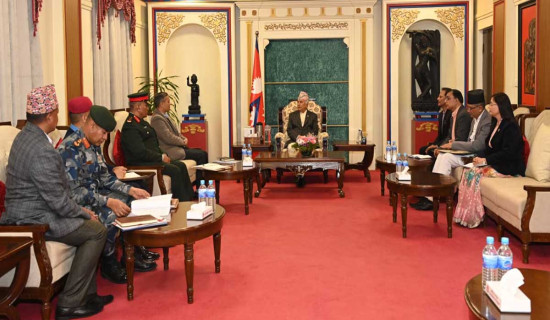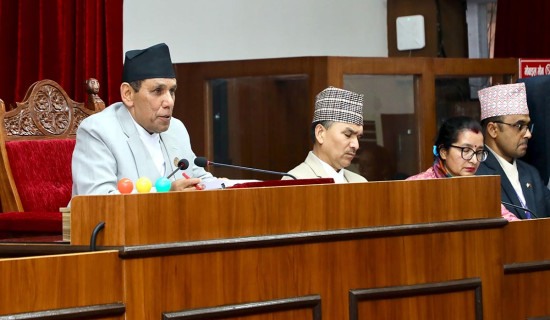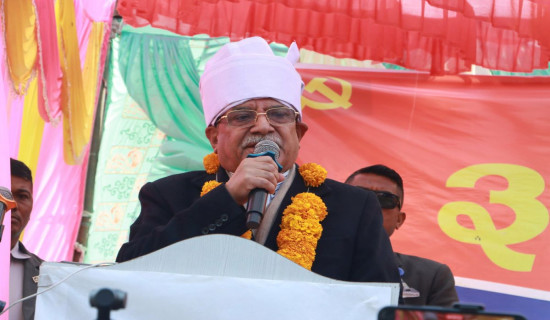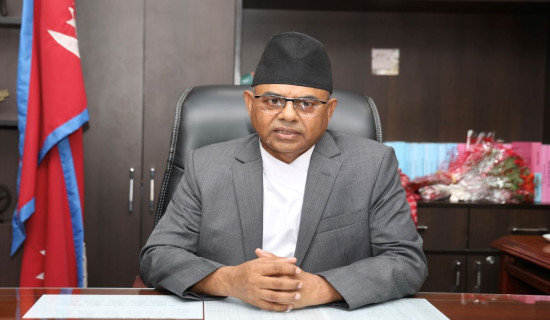- Saturday, 14 February 2026
Airfare Hike Hits Passengers Hard
With a reduction in operation hours of the Tribhuvan International Airport (TIA) for its upgrading, international airlines have been bound to slash the number of their flights to and from Kathmandu significantly. According to sources at the Civil Aviation Authority of Nepal (CAAN), the airlines have decreased their flights by about 30-35 per cent. This has led to a shortage of air tickets and a subsequent alarming hike in airfare. The busy airport now remains closed from 10 pm to 8 am daily. The airport improvement project is scheduled to be completed by the end of March next year. The airport used to remain shut only for four hours from 2 am to 6 am before the start of the expansion work. TIA used to handle about 300 domestic flights and nearly 100 international flights every day.
Heavy traffic
The airport has the capacity to host about 5 million passengers annually. However, the congested airport handles around 8 million passengers every year. But due to heavy air traffic, flights rarely remain smooth. Under this project, the CAAN aims to expand the parallel taxiway on the southwest side of TIA, the international apron on the north side, and the hangar apron on the east side. Under this project, a taxiway is also going to be built parallel to the runway. Upon the completion of the existing expansion project, the airport is anticipated to be able to host as many as 10.2 million passengers annually. As flights may have to go through additional air traffic congestions at TIA after its expansion, the responsible authorities must consider utilising the Gautam Buddha International Airport (GBIA) based in Bhairahawa and the Pokhara Regional International Airport (PRIA) in Pokhara as soon as possible. Had they worked on this prior to starting the TIA improvement project, the ongoing issues of flight scarcity and airfare increment would not have emerged.
Even after the construction of the two new airports, TIA continued to be the country’s sole airport for international flights. Some international airlines have begun serving the GBIA for some days while the PRIA has yet to host any regular international services. Local business community of Rupandehi had to lobby hard for the operation of the newly-built GBIA. Many entrepreneurs had made a huge investment in tourism and other enterprises in Lumbini, Bhairahawa and Butwal since the commencement of the implementation of the airport project. But they have been unable to gain the return of their investment because the airport has not come into operation in full swing. Tourism entrepreneurs as well as other investors in Pokhara have also drawn the government’s attention towards bringing the newly-constructed airport into operation.
As per ticketing agents, the airfare for the Kathmandu-Delhi sector has increased to Rs. 60,000 from just Rs. 12,000-Rs. 15,000. Likewise, passengers are compelled to pay up to Rs. 80,000 for flying to Dubai from Kathmandu. Up until recently, the airfare on this route was only about Rs. 30,000-Rs. 35,000. Similarly, an air ticket for the Kathmandu-Riyadh sector has increased to Rs. 80,000 from just Rs. 40,000-Rs. 45,000. And a passenger flying to Kuwait from Kathmandu has to pay up to Rs. 100,000. The airfare on this route was about Rs. 45,000 in the past. The Kathmandu-Doha sector airfare has also risen to Rs. 80,000 from Rs. 35,000-Rs. 40,000. Likewise, each of passengers travelling to Kuala Lumpur from Katmandu needs to pay Rs. 65,000. In the past, the airfare on that route was only about Rs. 35,000.
Though expanding the airport is essential, the authorities should not have planned for closing the airport for 10 long hours. The shutting down for such a long period is sure to have an adverse impact on the national economy. When there are limited flights and airfares are not affordable for the common passengers, there will be less passenger movement. Tourism is one of the major economic activities, generating jobs and revenue. It is needless to say that this multifaceted industry is the second largest source of foreign exchange earning following the remittance sector. The significant fall in the stock of foreign currencies during the peak times of COVID-19 was a clear indication about how the foreign exchange earning depends on the tourism sector. Tens of thousands of people also became jobless during the time.
A higher airfare has always been one of the obstacles to Nepal’s tourism growth. The sudden extra increase in airfares is expected to shy away many foreign tourists. In addition, this will affect Nepali migrant workers and students as well. As many as 1,500 Nepali foreign job aspirants leave the country daily. And the law has bound them to use TIA as the exit point. So, the responsible authorities must take this matter seriously and step up necessary measures immediately to tackle it.
Strict vigilance
Meanwhile, various stakeholders have reached a consensus to ensure that air tickets are available to passengers at a reasonable price. Representatives of different government bodies and domestic and international airlines recently held a meeting to discuss the issue of airfare increment. The gathering decided to suspend the right of the ticket booking agent (TBA) in order to address the current problem of exorbitant airfare rise. There has been a practice among airlines to give tickets en masse to travel agencies for selling. In case of scarcity of air tickets, the ticketing agents are found selling tickets at a much higher price. They often do it in collusion with the concerned airlines. Anyway, the government has taken this initiative to deal with the problem of airfare hike. The airlines are now required to fix the airfares and make them public to avoid cheating passengers. The relevant government bodies need to remain vigilant to make sure that airlines as well as ticketing agents are following the deal strictly.
(The author is a former deputy executive editor of this daily.)
















